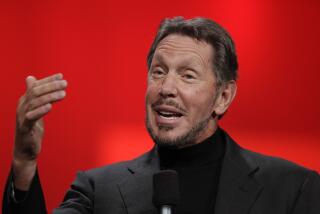Poolmart Keeping Head Above Water : Retailing: Despite tactics of its co-founder and losses, the company plans to add stores.
- Share via
Among the investors who bought stock in Leslie’s Poolmart when the Chatsworth-based company went public in April was Philip Leslie, its co-founder. He plunked down $11 and bought a single share.
A month later, Leslie’s Poolmart, the nation’s biggest specialty retailer of swimming pool supplies with 104 stores in 23 states, posted a first-quarter loss of $2.7 million and projected a disappointing second quarter. The company’s new stock plunged 25%, and it hasn’t done much since, closing Monday at $8.25 a share in over-the-counter trading.
So Phil Leslie’s modest investment is already under water. And he couldn’t be happier.
Leslie, who co-founded Leslie’s Poolmart in 1963 and built it into the nation’s premier pool supplies chain, was ousted as the company’s chief executive during a bitter takeover fight three years ago.
Despite Phil Leslie’s ongoing attempt at revenge, Leslie’s Poolmart’s new management says the company is doing fine and plans a big expansion.
Phil Leslie bought into a small rival company called Sandy’s Pool Supply Inc., a North Hollywood-based chain that he’s rapidly expanded, and he’s repeatedly made clear that he’d love to run his old company into the ground.
After paying $500,000 for half of Sandy’s, he lured away about 40 of Leslie Poolmart’s employees. They quickly expanded Sandy’s to 21 stores from only two and started a mail-order business to vie with Leslie’s mail-order unit. A “non-compete” agreement Phil Leslie signed with his old company was fairly lax, and he put some Sandy’s stores within a short drive of Leslie’s outlets.
Until recently, Leslie’s Poolmart’s management has generally been quiet in the face of Phil Leslie’s barbs, including his assertion that the new team at Leslie’s lacks experience and depth.
“Phil would lead you to believe that it really is a big advantage for you to be a career swimming pool supplies person,” Leslie’s President Brian P. McDermott said in an interview. “Obviously there’s a benefit to experience. But it’s a simple and straight-forward enough business that, with our group coming in, we felt we would supplement quite a bit of that loss.”
McDermott also challenged Phil Leslie’s claim that Sandy’s is taking market share from Leslie’s Poolmart.
Others are skeptical. Jules Field, publisher of Pool & Spa News magazine in Los Angeles, said that although he has no specific market-share figures, “you can’t have two major merchandisers in our industry and expect that they don’t have an effect on one another. That’s not realistic.”
Nonetheless, Phil Leslie might be in for some disappointment. Despite the slow sales start this spring, Leslie’s Poolmart plans to open an additional 25 to 30 stores during the next year.
Also, Leslie’s paid off all of its long-term debt with the $19.5 million in proceeds from the April stock offering. Without the debt, much of the cash from Leslie’s operations that formerly went to pay debt interest--it totaled $3.2 million last year--”will now come down” to the bottom line, McDermott said.
McDermott said the soft conditions in the second quarter, which prompted the May announcement that unsettled Wall Street, were related to unexpectedly cold and rainy weather in the West and elsewhere in the nation during April and early May.
Those factors obviously were not included in the prospectus for Leslie’s initial stock offering April 18, he said. But because that time period marked the start of Leslie’s busiest season, the weather conditions had a serious impact on the company, he added.
Leslie’s debt was incurred when Hancock Park Associates, an investor group, bought the company from Phil Leslie and its other 50% owner, Raymond Cesmat, in 1988 for about $17.5 million. Leslie was reluctant to sell, but Cesmat--who was going through a divorce and wanted to sell--got court approval to dissolve the company, which is allowed under an obscure California law affecting 50% owners.
Then in May, 1988, Cesmat and a court-appointed director fired Phil Leslie on grounds that he was intentionally interfering with the buyout. Chaos ensued at Leslie’s. Many of its employees, siding with Leslie, did not show up for work and picketed some sites, forcing most of Leslie’s stores to close for several weeks.
Eventually, the Hancock Park group pulled the company back together.
More to Read
Inside the business of entertainment
The Wide Shot brings you news, analysis and insights on everything from streaming wars to production — and what it all means for the future.
You may occasionally receive promotional content from the Los Angeles Times.











